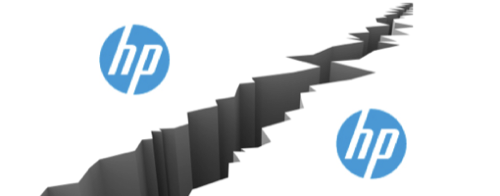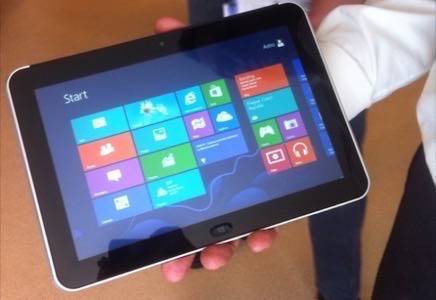
Hewlett-Packard is in big trouble. That’s hardly news. But things have now gotten so bad that Wall Street analysts are starting to call for the breakup of the iconic tech company. Here’s why they’re right.
Lately, HP hasn’t had much good news for investors. Its stock is in the tank and is expected to fall even lower. The PC market that powers much of HP’s top line is shifting quickly to smartphones and tablets and the company has no competitive products in those areas. And HP is behind rivals Oracle and IBM in selling the latest technologies to businesses.
As of Wednesday, the company could no longer claim to be the world’s top PC maker. Gartner reported that Lenovo had surpassed HP in third-quarter shipments, ending the company’s 6-year reign atop the charts. HP issued a response quickly, pointing out that Gartner rival IDC, which released its numbers the same day, still had HP hanging on to the No. 1 spot by two-tenths of a percent.
But bragging rights are not what investors care about. What bothers them is Chief Executive Meg Whitman’s inability to present a clear vision of dragging HP out of this mess. Put everything together, and the calls to break up the company make a lot of sense.

The Benefits Of Splitting HP
In a recent research note, UBS AG analysts argue for separating the division that sells PCs and printers from the one that sells software, hardware and services to companies. Both are fully developed businesses that could stand on their own. If activist shareholders were to force HP to spin off its PC and printer division, the company would have several options on how to make it happen. UBS did not offer any recommendations.
Whitman, of course, believes HP should stay whole, unlike her predecessor Leo Apotheker, who was ousted shortly after announcing that he was considering spinning off the PC business.
In retrospect, Apotheker’s blunder was not in contemplating the split, but in announcing a possible exit. No CEO should talk about selling a business that accounts for roughly a third of a company’s revenue until he’s ready to announce a buyer.
This time around, from Wall Street’s perspective, the bottom line is the benefit to shareholders. Spinning off the PC and printer division would boost the stock price by 50% to nearly $21, compared to its current price of roughly $14, the analysts said, as reported by Bloomberg.
Tech Researchers Say Keep HP Whole
The focus on stock price rankles tech market analysts, who see it as Wall Street’s eagerness to gut a company for short-term gain. “Wall Street doesn’t usually take the long view, in part because of the uncertainty of whether it will work out,” said Frank Gillett, analyst at Forrester Research. “The analysis ignores the possible value of creating a true competitor to IBM.”
Ezra Gottheil of Technology Business Research is more blunt. “I think Wall Street is crazy.”
They argue that the synergies between the divisions in a unified HP make the company much stronger than either unit would be on their own.
But leaving HP whole likely means years of poorly performing stock, and shareholders are desperate for a return from a company that has delivered nothing but disappointment for a long time.
Do Shareholder Disappointments Force Action?
Just this month, HP stock plummeted 13% after Whitman told investors that profits during the next fiscal year wouldn’t come close to meeting expectations. The latest bit of bad news followed a four-quarter string of sales reductions.
UBS’ argument for putting the cleaver to HP is that the individual parts would gain “focus” and branding power, which would more than offset any advantages they would lose in negotiations with suppliers or from no longer being a one-stop shop for customers. While HP continues to adamantly say no to a breakup, UBS believes it could be forced to reconsider, if battered stockholders demand it.
Where Is HP’s Growth Going To Come From?
Whitman acknowledges that HP’s only growing division is the one that sells software and hardware to companies. Nevertheless, she remains convinced that once righted, the PC and printer division would also grow. UBS believes she’s too optimistic.
While UBS is leading the call for a breakup, it’s not the only investment bank soured on HP stock. Seeing no clear direction from the company, Citigroup downgraded the stock Tuesday to “Sell” with a price target of $13.50. As of the close of trading Monday, HP stock was down almost 44% from a year ago.

HP’s Chances Of Recovery
If it’s even possible, any HP turnaround will take years. The company is trying to revive the PC and printer division even as consumers are moving away from both.
Instead of buying PCs, people are increasingly turning to the Apple iPad and Android tablets. HP is promising in January a Windows 8-based business tablet called the ElitePad 900, but doesn’t plan to offer a consumer model. (It does have a consumer-oriented convertible tablet/laptop in the works, called the Envy x2. )
As far as printing goes, slick tablet screens and cheap storage in the cloud are slowly killing the need to print pictures, which HP once hoped would be a major driver of ink sales.
In the high-margin business market, HP is chasing IBM and Oracle, which recently announced a cloud service for renting processing power, storage, database software and business applications. HP doesn’t have a strong cloud offering at a time when businesses are looking for such services to reduce on-premise hardware and software costs.
In fact, HP’s only concrete plans to raise earnings is to get smaller. The company says it will cut 29,000 jobs by the end of fiscal 2014 to reduce expenses by as much as $3.5 billion.
For now, UBS is only one major Wall Street firm calling for a split. But that will surely change if HP can’t show measurable progress.
Lead image courtesy of Shutterstock. ElitePad image by Fredric Paul for ReadWriteWeb.

















